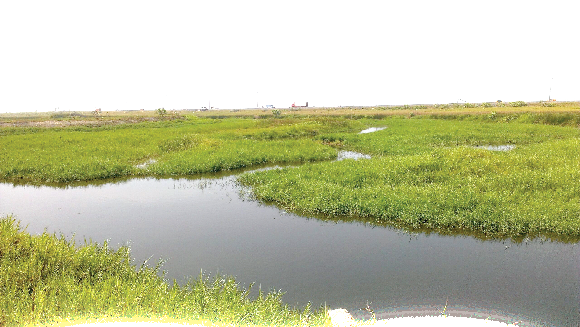A Ramsar site is a wetland site designated to be of international importance under the Ramsar Convention, also known as The Convention on Wetlands.
The Convention is an intergovernmental environmental treaty established in Iran in 1971 by UNESCO, which came into force in 1975.
These sites have been designated under the criteria of the Ramsar for containing representative, rare or unique wetland types or for their importance in conserving biological diversity.
This international treaty seeks to protect these significant sites.
Under the convention, governments are entreated to ensure the protection of all areas designated as Ramsar Sites.
In Ghana, the convention entered into force on June 22,1988.
There are five designated coastal wetlands in Ghana, namely Keta Lagoon Complex, Songhor, Sakumono, Densu Delta and Muni Lagoon.
These are meant to be protected as set out under the convention.
A Ramsar designation helps with planning the sustainable development of the area.
Being a Ramsar site means that local people can practice sustainable agriculture, fishing, forestry and tourism, using the renewable resources of the site.
Wetlands have been used for centuries as grazing for domestic stock, and as a source of reeds used for thatching, hut
construction and basket weaving.
They provide opportunities for fishing, hunting and observing wildlife, especially birds.
Bugs, frogs and salamanders, fish, birds, snakes and turtles, and mammals like mice, squirrels, deer and bears all like to use wetlands.
In fact,70 per cent of the endangered species in the state depend on wetlands to survive!
Wetlands provide them with the space they need to live and get food.
The Keta Lagoon lies in the far south east of the country, near the international frontier with Togo.
It is separated from the Gulf of Guinea by a narrow strip of a sandbar.
Keta Lagoon, also called Anlo-Keta Lagoon, is the largest of the over 90 lagoons that cover the 550 km stretch of the coastline of Ghana.This lagoon is
126.13 km in length.
Seasonal
There are seasonal inflows of sea water during high tide from the Gulf of Guinea and regular inflow of rivers.
The rivers, which drain into the lagoon,include the Aka,the Tordzi River and Belikpa stream, which enter the lagoon from the north.
The lagoon is surrounded by many settlements.
The towns include Anloga, Woe,Keta and Kedzi to the south, Aborlove Nolopi,Anyako and Anlo Afiadenyigba to the north,Kodzi, Alakple and Tregui to the west and Denu and Adina to the east.
Over the years, population growth, extensive human activities and climate change have all contributed to reducing the volume of water in the lagoon,which appears to be drying up.
The lagoon has become part of the daily existence of the people of Anlo land.
In 1992,the Keta Lagoon was placed on the list of Wetlands of International Importance by the Ramsar Convention on Wetlands and in 1999,work began on measures to limit further erosion and control flooding of the coastal region.
Mining
Salt mining is also a special skill of tourist attraction.
A tourist once exclaimed: very beautiful, I have never seen a place like this; the view is exciting, great culture and diverse sources of income generation.
The lagoon is the biggest I have seen so far and I like everything about it.
One of the well-known Ramsar sites is the Sakumono in the Greater Accra Region.
It covers an area of 1,364 hectares (3,500 acres) and is situated along the coastal road between Accra and Tema in the Greater Accra Region,about 3km (1.9
miles) West of Tema.
The Ramsar site is also the relaxation and feeding grounds for over 70 water-brain species.
Unfortunately, the devastation of the Lagoon is heartbreaking.
The writer is the Coordinator,
Forests, Biodiversity and Climate Change,
Frontier Institute of Development Planning (FIDEP).

